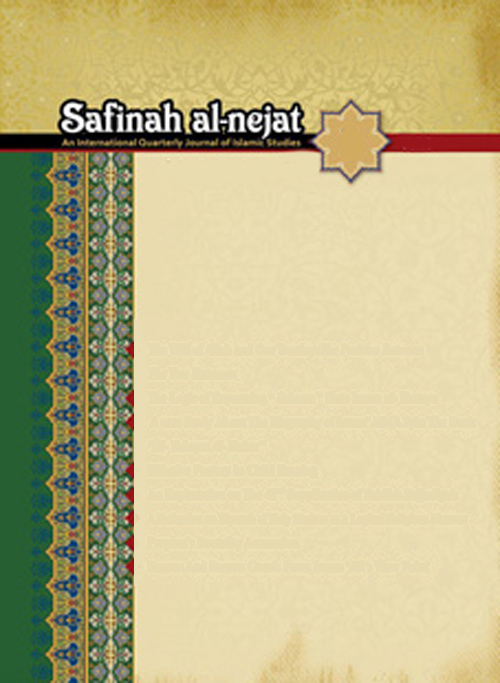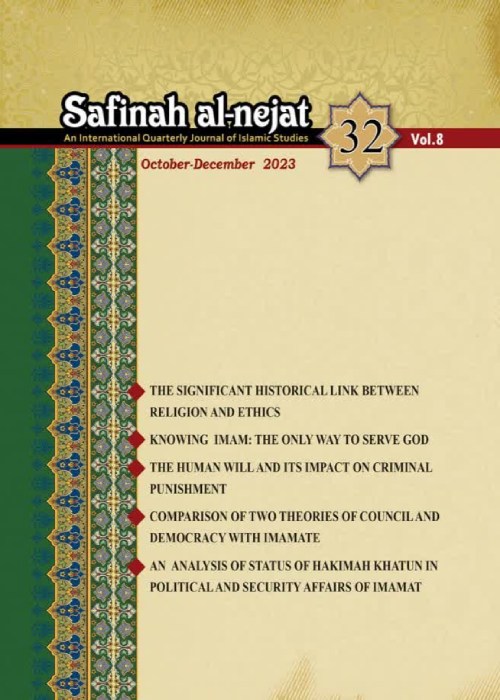فهرست مطالب

Safinah al-nejat
Volume:1 Issue: 2, Spring 2016
- تاریخ انتشار: 1395/06/20
- تعداد عناوین: 8
-
Page 5
-
Page 7In this article, the chain of sequence that Allah creates for an action to take place in the world is explained. The different types of will and intention of Allah is addressed. The freedom of the will of human being in this connection is also discussed. The rational necessity of regarding Allah pure from any creation including the knowledge and the will that He created is another subject that is offered in this part. Some traditions of Shia Imams (PBUT) supported by the verse of the Quran are provided to verify the detailed discussions.Keywords: Will, intention, planning, decree, knowledge, commandment
-
Page 22The narrations of the infallible leaders have an important role in explanation of the verses of Quran. This application and importance are stated in some verses and narrations. The author of the present article has highlighted 3 application of the narrations in interpreting Quran. A.Inferencing methodological bases and rules of interpreting Quran (The important characteristics of Quran such as guidance, comprehensiveness, internal harmony, multidimensionality, its freshness during the centuries, its general and particular meanings , its Muhkam and Mutashabih verses, rejecting interpretation of the verses based on your understanding and judgment, etc;) B. Setting the bases of Quranic interpretation; It means that a commentator should receive the fundamentals of his (her) religious knowledge from the holy Quran and traditions of the infallible leaders, and then begins to interpret the holy Quran. C. The role of narrations as a source of interpretation (The reason of revelation of the verse(s), application of a verse in its exact case, removal of superficial contradiction among verse(s), ).Keywords: Quran, Knowledge, concept, Quran, comment by the infallible persons, traditions as explanations to Quran, sources of comment of Quran, narrations, Quran, characteristics, Quran, different kinds of verses, Quran, sciences, history
-
Page 42Sent down from God in the Arabic language to the Prophet of Islam, the Holy Quran directs its message to the faithfuls to teach them Quranic culture. Among the issues that are suggested, emphasized, and commanded in the Quran is the issue of finances, i.e. ones personal finances and social economics, both of which play important roles in ones life. Peoples livelihoods are dependent upon these matters, and ones social relations are also affected by them. The subjects that Quran teaches include the giving of charity and loans and the abstention from taking usury, and the quality of which is discussed and taught to those who have faith. By repeating these subjects in various chapters, the Quran reminds Muslims and gives them practice in these acts so that they become habitual, and society adopts the way of God to achieve a peaceful existence and financial parity. Using an analytical-descriptive method, this article gives the instructions of the Quran regarding the usage of property and presents. Human societies can set these solutions as an example for themselves to reach worldly happiness and be needless of others.Keywords: Quran, Personal Finances, Social Economics, Charity, Zakat, Usury, Loans
-
Page 56logic in the word of Arab means prevention. Logic is the foundation of a kind of gnosis which leads human beings to the right path. Though it should be noticed that logic is not an innate soul-bound trait, it is a blessing from God which lightens up human beings soul. On the other hand, the perceptions of logic is clear and unerring and are trustable in their essence. While the logic which is dealt with in Philosophy is erring and a stage of minds understanding. The discrepancy between logic and words have various forms and it is impossible to give them the same judgment.Keywords: Vahi(revelation of God to His Prophets)
-
Page 64In this article about ‗the verses of Surah Tahrim used in Sahifah Sajjadiyah, the researcher tried to highlight the deep relationship between the words of Imam Sajjad (AS) and words of God in Quran. Based on the research, the most repeated verses in Sahifah are from surah Baqarah, but that verse which is used by Imam and is specifically about Tawbah (repentance) is the verse 8 of Tahrim Surah (sanction);it has been used ten times. Verse six of this Surah is also used in Sahifah once.Keywords: Sahifah Sajjadiyah, prayer, Tawbah Nasuh
-
Page 81In the present article, the author evaluates the religious child-rearing and declares the benefits in this kind of training. First, the necessity of this training has been introduced and then the characteristics of such a training have been introduced.at the end, the goals of religious training have been introduced.Keywords: child, rearing, ultimate goals, detailed goals, comprehensive goals, faith, recognition, enforcement
-
Page 87This article which is a very brief review over the reappearance of Imam Mahdi (A.S.) in religious books, at first tries to picture the common problems of our todays life; depression, violence, injustices, and so one; then he introduces the Promise of God who is going to put an end to all these hardships.Keywords: religion, Mahdi (A.S.), holy books


